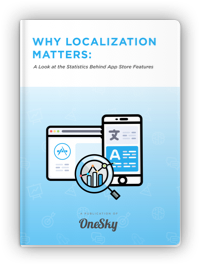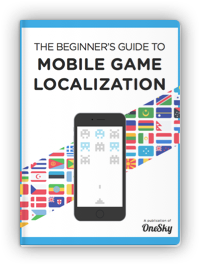Localization Importance for Businesses in 2021
Your website, product, or app may be the best thing since sliced bread, but if it’s only available in English, you’re probably leaving (a lot of) money on the table.
55% of global consumers say they only buy products from websites that provide information in their own language.
Even among users proficient in English, 65% prefer to peruse content in their native tongue.
In addition, 72.4% of global consumers want to use their local language when shopping online.
You could be missing out on 40% of your total addressable market if your website isn’t localized.
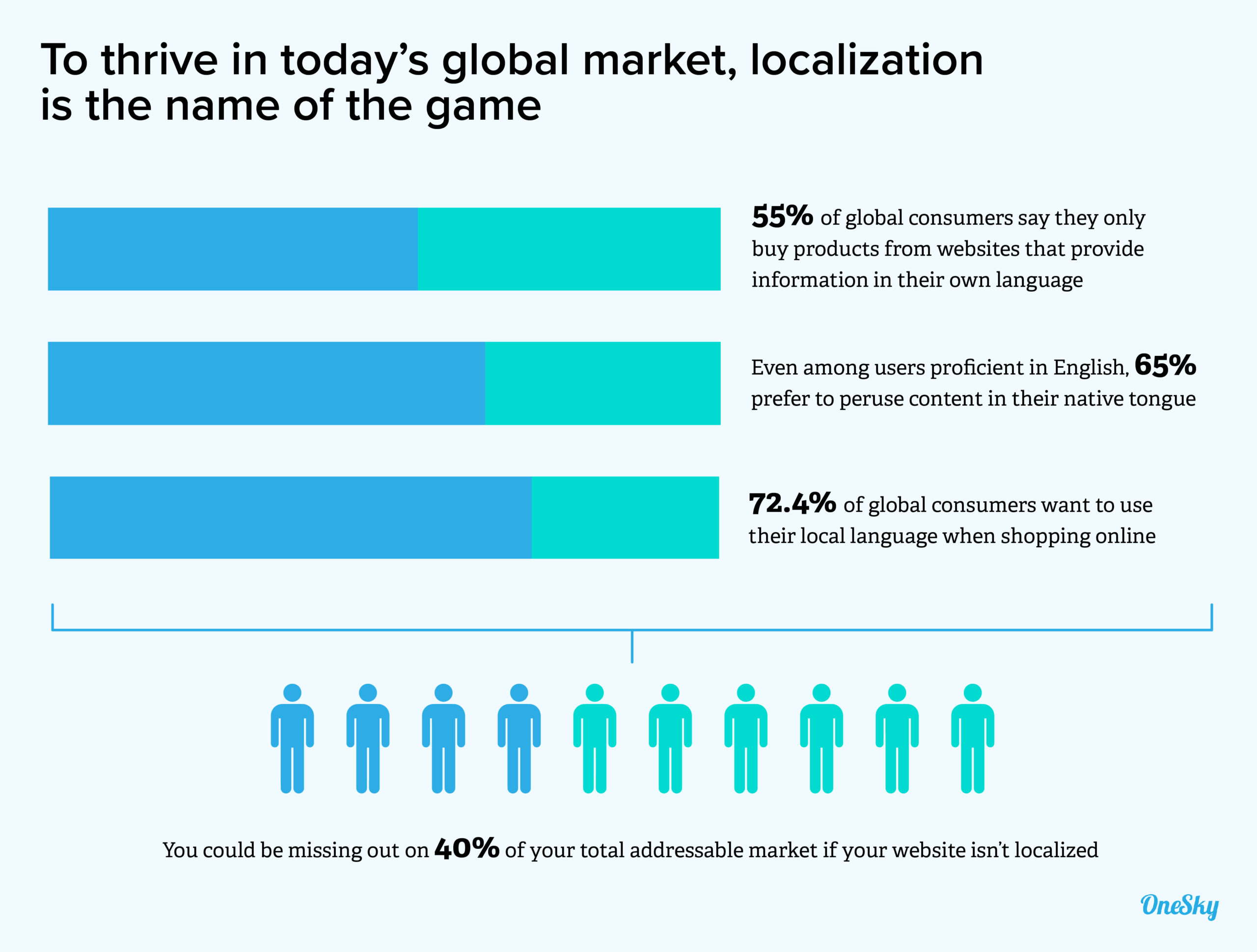
What Is Localization?
Localization (sometimes abbreviated as ”l10n”) is the process of making adjustments to your products or content to meet the needs of a specific geographic market.
Besides language, a localization strategy considers the political, cultural, and legal aspects of an area, which affect how the target market interacts with your brand and uses your products.
Localization involves different tactics, such as using culturally-sensitive images or colors, adjusting formatting and user interface design, applying local currency and measurement units, and offering payment methods preferred by the local market.
Localization is sometimes confused with its close partner, internationalization (or “i18n”).
Although these two concepts work hand-in-hand, they are different.
Simply put, i18n involves changes in the source code so that a piece of software can support any language. L10n provides local content to fill the container set up by i18n and doesn’t involve changes in the source code.
Why Localization and Not Just Translation?
In today’s market, simply translating your content into different languages is no longer enough.
While translation is still a crucial step in the localization process, it doesn’t guarantee an engaging experience that speaks to a local audience. Brands need an all-encompassing localization strategy to address the sentiment and needs of local audience segments.
What is Localization’s Importance in 2021?
You may wonder, why now?
Maybe you have been chugging along just fine for years. Maybe you’re starting out and trying to get the most of your resources. Why should you invest in localization in 2021 and in the years to come?
If you’re asking yourself these questions, keep reading to learn exactly what localization’s importance is for modern businesses.
Brands Must Cater to Local Markets
Consumers now expect personalized experiences that address their unique circumstances, including purchase history, preferences, demographic information, and of course, geographic location. Delivering such a targeted experience is key to building customer relationships and driving conversions.
The pandemic necessitated executive orders and legislation changes that affect different regions differently. This further highlights the need for companies to adjust their communication strategies so they can provide relevant information to each geographic area and address the needs of local customers.
As the dust is still settling in 2021, it’s more important than ever for brands to be sensitive to local market situations. They need to communicate the most pertinent information to stay top of mind, meet market demands, and advance their relationships with the audience.
Modern Marketing is Local Marketing
51.8% of all internet users reside in Asia, particularly China and India. In fact, Chinese boasts the most number of first-language speakers, and China is now the largest retail market in the world.
What does this mean for brands? Since people prefer to consume content and shop in their native language, English is no longer king in the online commerce world. Companies must cater to local preferences to capture market shares in today’s fragmented marketplace.
Genuine Connections Drives Global Sales
To tap into the vast potential of today’s global marketplace, you need to build genuine connections with your prospects. This means meeting them where they’re at and speaking their language — literally and figuratively.
Many English idioms and cultural references get lost in translation. Meanwhile, a mention of local events or personalities can help you earn the trust of a local audience more quickly than any award-winning copy. What can you do or say to make your audience feel like you’re “one of them”?
Don’t overlook seemingly minor details that can help improve your communication.
For instance, most people in the U.S. consider Sunday the first day of the week. For those in the U.K., their week starts on Monday. But in the Maldives? Their weekends fall on Friday and Saturday.
The Benefits of Delivering a Localized Online Experience
You’re intrigued. But is creating a localized experience for each market worth the time and effort?
Here are the benefits of localization and why you should hop onto the bandwagon:
Market Penetration and Opportunities
If you have tried to break into a foreign market, you know it’s not a walk in the park. In particular, communication barriers are major hurdles. Aligning your brand with the local culture makes it much easier to overcome these challenges. It helps you get accepted by the local consumers and gain traction in the marketplace.
Market Expansion and Sales Growth
A comprehensive localization strategy allows you to reach more potential customers through various channels (e.g., website, social media, emails, mobile apps) in their preferred language and within the appropriate context. You can meet your audience where they are at to build meaningful relationships while promoting your products in the right place and at the right time to drive sales.
Time-to-Market
A well-designed l10n process can streamline the localization of your products and marketing materials to overcome cultural barriers and speed up time-to-market. You can gain a more diverse customer base, engage with the audience more quickly, and even gain the first-mover advantage when introducing new products to win more market shares.
Competitive Advantage
If you’re entering a new market, especially in a foreign country, you’ll likely be competing against local businesses that have already established a presence. Localization helps you build trust with the audience and level the playing field. If you’re competing against other “outsiders” that haven’t localized their content, you’ll be able to position your brand favorably among local audiences.
Brand Image
Innocuous product names or witty taglines can get lost in translation or even turn into a disaster that hurts your brand image.
For example, Chevy’s Nova (“no va”) means “doesn’t go” in Spanish — doesn’t bode well for a car! In addition, a color palette can easily evoke different feelings in different cultures.
A comprehensive localization strategy gives you full control of your messaging to deliver a consistent and on-brand experience across all markets.
Search Engine Optimization (SEO)
68% of consumers start their online experiences with a search engine. It’s more important than ever to get in front of prospects when they’re researching online. Localized website content, including keywords, metadata, images, dynamic PDFs, etc., can augment your online presence by making it easier for customers to find your site when they’re shopping online.
Customer Experience
Localization research will help you understand and deliver on what’s valuable to different audience segments.
For example, you can discover and implement the preferred payment methods in different locales to reduce friction along the purchasing path. You can also provide the most helpful content for different audiences and highlight key benefits in your sales copy.
This knowledge will help you better connect with the local audience, build brand awareness, and deliver a relevant shopping experience.
Customer Trust and Loyalty
Most people want to do business in a language they can understand. Information communicated in your audience’s native tongue is more likely to resonate with them. When you go the extra mile to speak your customers’ language and respect their culture, you can accelerate trust and commitment with your customers. They will also be more likely to tell others about your brand.
Customer Service and Customer Retention
75% of consumers are more likely to buy from a website again if the merchant delivers post-sales customer support in their preferred language. By localizing your support services, you can help buyers troubleshoot more effectively and get the most from your products. This will increase customer satisfaction, so they’re more likely to make repeat purchases.
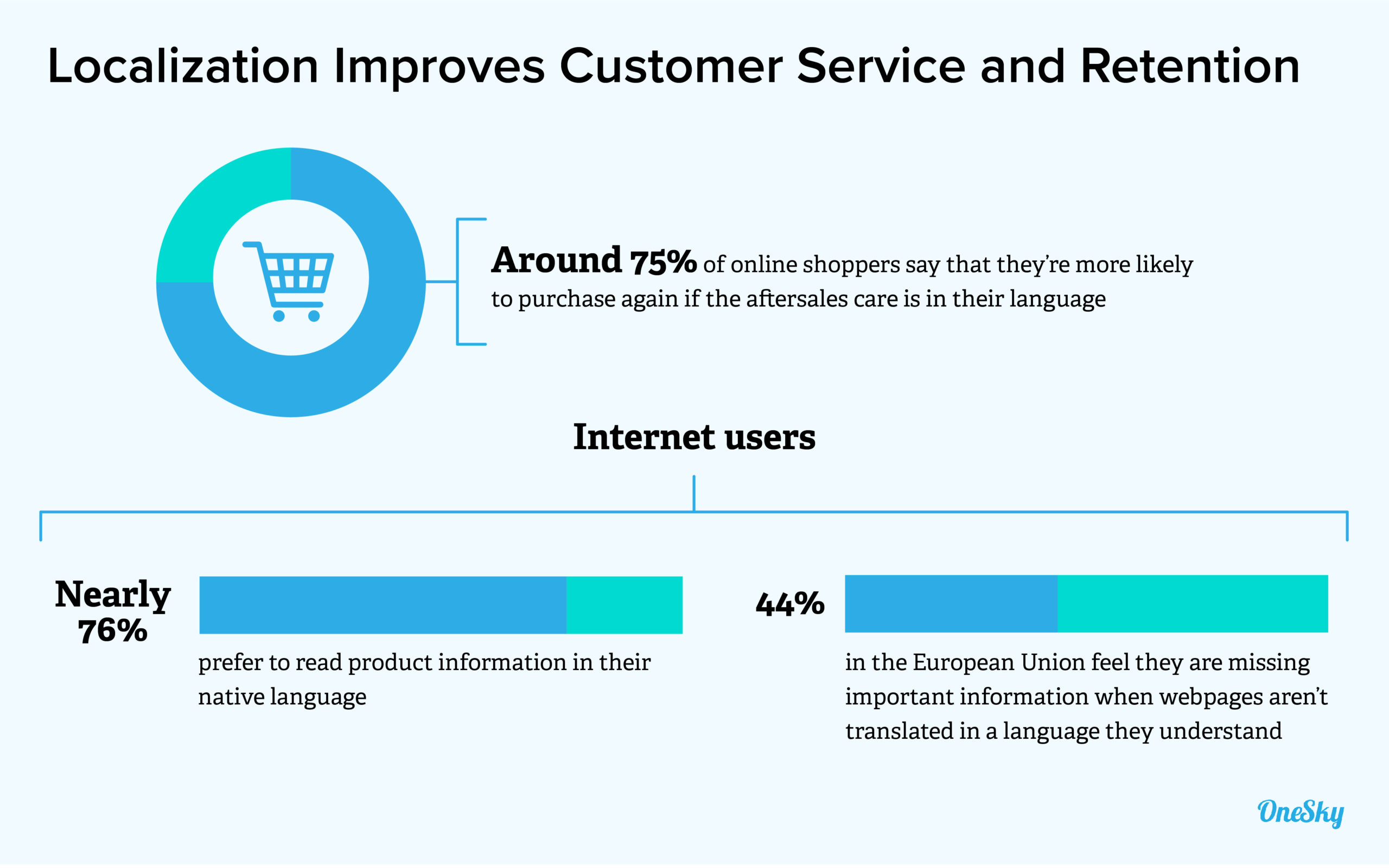
Cost Reduction
Localized websites and content aren’t just great for consumers. The standardized approach also allows you to streamline training and internal processes for sales and support teams. For example, they can access market-specific product data and draw from correct information compliant with local regulations so you can avoid costly errors and delays.
Risk Mitigation
You must be aware of a region’s political, historical, and cultural considerations when entering a new market. A localization strategy takes these factors into account, so you can avoid pitfalls such as using verbiage that could get you into hot water — such as phrases with negative connotations or terms that infringe upon local regulations.
Ready, Set, Localize!
Localization’s importance makes it a veritable linchpin to growing your customer base and expanding your market share in today’s global market. It helps you reduce time-to-market, drive sales, lower costs, mitigate risks, and improve customer retention.
Where to start? Here are five key questions to consider:
- What content can you localize?
- Where are you pulling your content?
- Is your website or app internationalized?
- Who is your target audience?
- What’s the extent of your localization?
There are many moving parts in a localization effort. Consolidating these tasks can help you streamline workflows while ensuring that nothing falls through the cracks. OneSky offers an end-to-end localization solution that covers 50+ languages so you can translate, localize, and test your apps, games, and websites all in one place.
See how our translation management platform works and get started for free today.

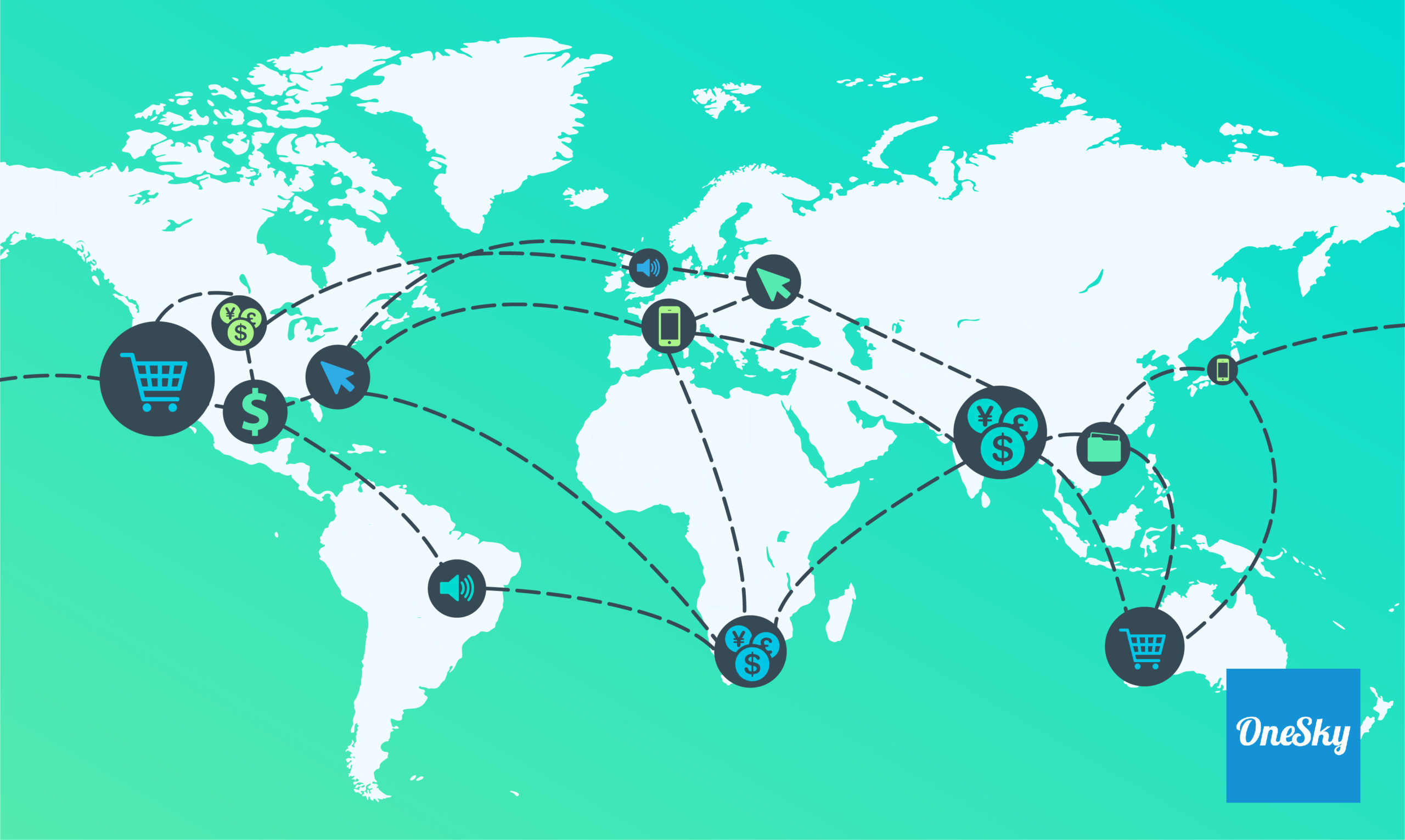

 Written by -
Written by - 



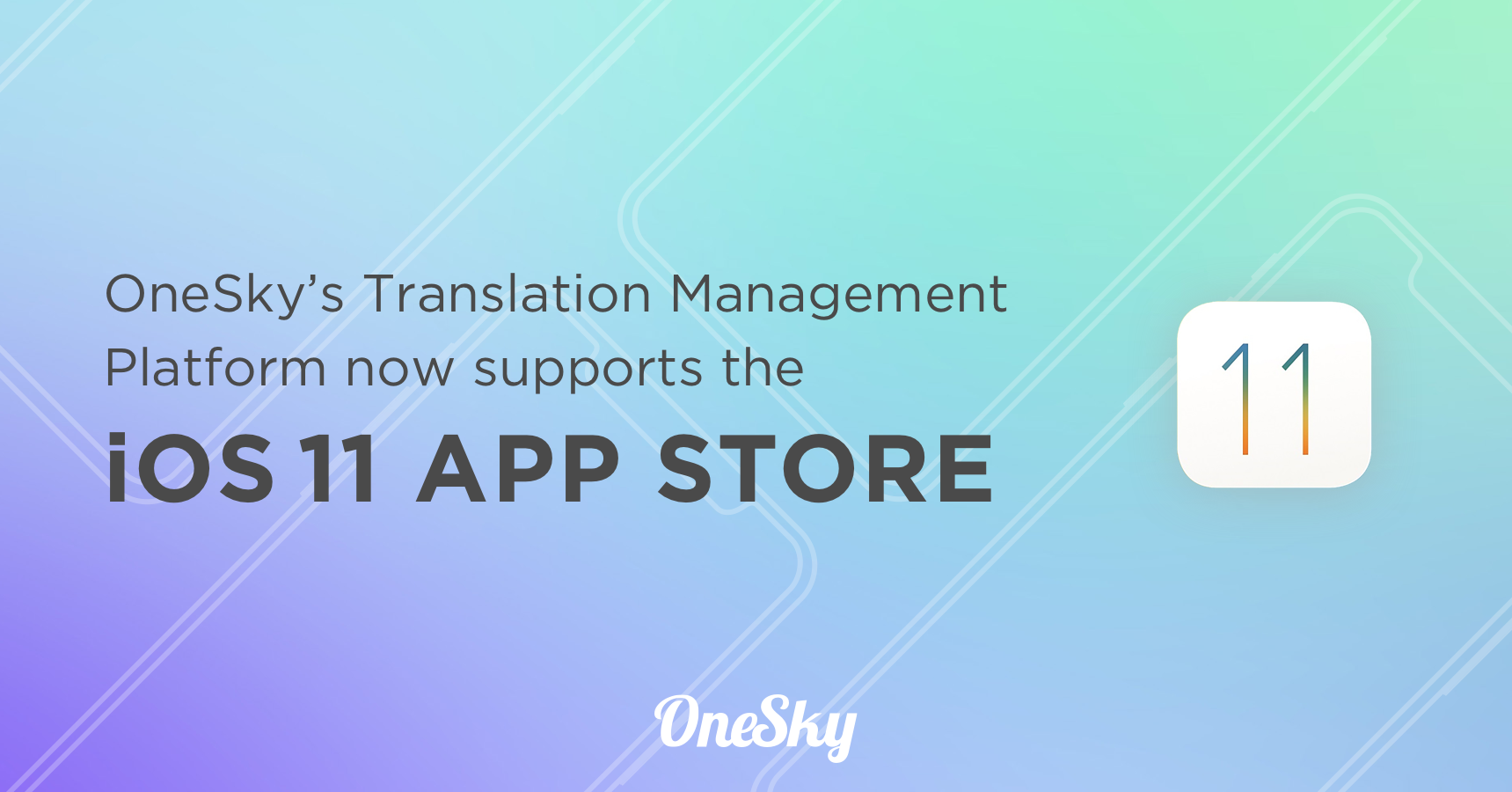
 Written by
Written by 

